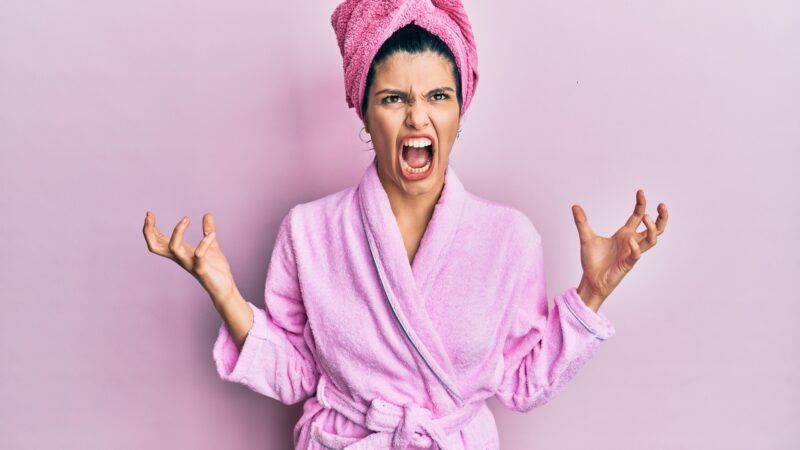The Biden Administration Crushes America's Brief Experiment in Showerhead Freedom
The Department of Energy's new energy efficiency rule drags us back to the dark days of 2013, when showers were allowed to emit no more than 2.5 gallons of water a minute.

Even in these uncertain times, we can be sure of one thing the new year will bring: worse, weaker showers.
On Tuesday, the Department of Energy (DOE) rolled back a bit of Trump-era deregulation that had allowed Americans to buy multiheaded shower units that emit more water, allowing a warmer, more pleasing cleaning experience.
This was a personal issue for President Donald Trump, who was known to lament the fact that even areas of the country with "tremendous water" had "sinks where the water doesn't come out….You have showers where I can't wash my hair properly, it's a disaster!"
The reason for this disaster: a 2013 regulatory change targeting multiheaded shower units and their supposed violation of energy efficiency regulations.
Since the 1990s, showerheads have been required by law to emit no more than 2.5 gallons of water a minute. In response, some manufacturers started selling shower units with multiple heads that individually complied with that water use limit but together surpassed it.
The 2013 changesrequired whole shower units to comply with the 2.5 gallons per minute limit. In December 2020, the Trump administration struck one of its few blows for freedom by repealing that rule and allowing multiheaded shower units back onto the market.
The final rule released by President Joe Biden's DOE yesterday continues the regulatory seesaw by reinstating the 2013 rule. Whole shower units must again spew no more than 2.5 gallons per minute. This new rule goes into effect within 30 days of being published in the Federal Register, which should happen within a few days.
Energy efficiency groups cheered the changes.
"This was a silly loophole from the beginning and the department was right to fix it," said Andrew deLaski, executive director of the Appliance Standards Awareness Project, to Bloomberg. "The good news is there was no clamoring for products that took advantage of this, and we can put this whole episode in the past."
It's hard to clamor for a product that was legal for but a few months. (The Biden administration had announced it would be reversing Trump's showerhead deregulation back in July.) Nevertheless, it is true that industry groups, as The Washington Post notes in its write-up of Biden's showerhead reregulation, did not push for changes under Trump.
Indeed, trade associations representing appliance makers—alongside energy conservation and environmentalist groups—actively opposed the Trump administration's deregulation on the grounds that they'd already spent money complying with existing regulations and the new rule would just open them up new competition.
Many manufacturers were singing a different tune when President Barack Obama first tried to regulate multiheaded showers off the market. Back then, they complained that Washington had no business telling them how to make a shower. But with millions sunk into compliance costs, their views on showerhead regulation have changed.
If regulations did allow multi-headed shower units, "some manufacturer out there will make them and will probably garner some markets share," Ben Lieberman, a senior fellow at the Competitive Enterprise Institute, told Reason in July. "From the perspective of manufacturers who are now making the compliant models, they see nothing to be gained by allowing the heavier flow models onto the market."
As with Biden's ongoing reregulation of dishwashers, the battle of the showerheads shows that industry is not inherently pro-regulation or pro-deregulation. Often, they're just pro–status quo.
Rent Free is a weekly newsletter from Christian Britschgi on urbanism and the fight for less regulation, more housing, more property rights, and more freedom in America's cities.


Show Comments (166)